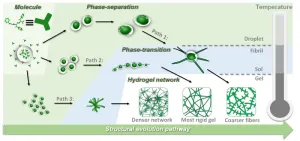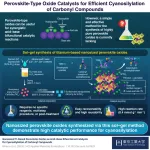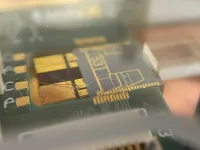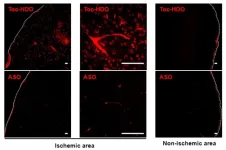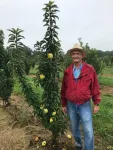(Press-News.org) Immunotherapy, particularly CAR T-Cell treatment for cancer, is extending the lives of many patients. But sometimes the therapy randomly migrates to places it shouldn’t go, tucking into the lungs or other noncancerous tissue and causing toxic side effects. A University of Rochester/Wilmot Cancer Institute team discovered the molecule responsible for guiding T cells toward tumors, setting the stage for scientists to improve upon the groundbreaking treatment.
The next step is to find a drug that can manipulate the key T-cell protein, ST3GAL1, said Minsoo Kim, Ph.D., corresponding author of an article in Nature Immunology that describes the research. If the investigation evolves as planned, such a drug could be added to the CAR T-cell regimen to ensure that T cells hit their targets, Kim said.
His lab is collaborating with other Wilmot investigators to screen for drugs that will accomplish that feat, while also minimizing the risk of life-threatening side effects.
“You can create very powerful treatments,” said Kim, co-leader of Wilmot’s Cancer Microenvironment research program at the UR, “but if they can’t get to their targets or they go to the wrong place, it does not provide the outcome you intended.”
Enlisting a patient’s own immune system to wipe out cancer has emerged as one of the most promising advances in cancer care.
CAR T-cell therapy involves extracting a patient’s own T cells, a type of white blood cell, and re-engineering them outside of the body to recognize cancer. Once the reprogrammed cells are infused back into the patient, they act as a “living drug,” searching for proteins on cancer cells for assault. In 2016, Wilmot was selected as one of the few national sites to begin clinical trials for this procedure, and later, upon FDA approval, became one of the first cancer centers in the U.S. to offer CAR T-cell treatment for eligible patients.
CAR T-cell therapy is only approved to treat blood cancers, including some forms of lymphoma, leukemia, and multiple myeloma, according to the National Cancer Institute. It’s easier for the altered T cells to drift toward cancer hot spots in the bloodstream, Kim explained — but finding their way to solid tumors such as breast, lung, brain cancer, or melanoma is a completely different story. The T cells have to work harder to migrate through tissues and organs and identify a solid tumor.
In fact, clinical trials testing this treatment in solid tumors have not been as favorable, Kim said.
Wilmot research suggests that something occurs during the re-engineering of T cells that blunts their homing properties.
In 2019, Kim and Wilmot colleagues Patrick Reagan, M.D., and Richard Waugh, Ph.D., received a $2.8 million National Institutes of Health grant to investigate the downside of CAR T-cell treatment, specifically what takes place when T cells sequester in noncancerous tissues.
Their discovery of the crucial migration-control gene that expresses ST3GAL1 came about through “unbiased genomic screening,” a more effective way to study the problem, Kim said. Investigators used a cutting-edge CRISPR technique to edit thousands of genes expressed in T cells, and then tested the migration-control abilities of those genes, one-by-one over the course of nearly four years, in mouse models.
Kim credited Yeonsun Hong, Ph.D., a staff scientist in his lab and first author of the Nature Immunology report, for leading the work, as well as assistance from faculty and staff at Wilmot’s highly rated Shared Resource facilities, led by John Ashton, Ph.D., M.B.A., director of the UR Genomics Research Center. Advanced imaging and use of microscope technologies with V. Kaye Thomas, Ph.D., allowed researchers to study the nuances of T-cell migration patterns, for example.
Kim is a Dean’s professor of Microbiology and Immunology, and professor of Pharmacology and Physiology at the UR Medical Center. Co-author Reagan, an associate professor of Hematology/Oncology, specializes in CAR T-cell patient care at Wilmot and has been involved in CAR T-cell research since the earliest clinical studies took place locally and nationally. Waugh, professor of Biomedical Engineering and Vice Provost of Research at the University of Rochester, collaborates with Kim by studying the mechanical properties of T cells. Funding was primarily provided by the NIH, in addition to Wilmot support.
END
University of Rochester researchers discover how to steer army of immune cells toward cancer
Findings will guide improvements to CAR T-cell therapy for breast, lung, brain cancer
2023-04-17
ELSE PRESS RELEASES FROM THIS DATE:
Poverty is the fourth greatest cause of U.S. deaths, analysis published in JAMA finds.
2023-04-17
Poverty has long been linked to shorter lives. But just how many deaths in the United States are associated with poverty? The number has been elusive – until now.
UC Riverside paper published Monday in the Journal of the American Medical Association associated poverty with an estimated 183,000 deaths in the United States in 2019 among people 15 years and older.
This estimate is considered conservative because the data is from the year just prior to the COVID-19 pandemic, which caused spikes in deaths worldwide and continues to take its toll.
The analysis found that only heart disease, ...
Steering phase-separated droplets to control mechanical properties of supramolecular peptide hydrogels
2023-04-17
Self-assembled peptide supramolecular hydrogels have shown great application prospects in various areas, including tissue engineering, drug delivery, and biosensing.
Precisely and flexibly controlling the mechanical properties of peptide hydrogels to match the targeted applications is important. The common methods to regulate the mechanical properties of supramolecular hydrogels generally include: changing the formula (different peptide sequences, adding cross-linking agents) or changing the environmental conditions (concentration, temperature, pH and ions), both of which inevitably change the chemical composition of the ...
Facile synthesis of high-performance perovskite oxides for acid–base catalysis
2023-04-17
Bifunctional acid−base catalysts are highly desirable for industrially relevant chemical processes. Owing to their ability to activate electrophiles and nucleophiles simultaneously, they allow the catalysis to proceed synergistically and cooperatively. Solid acid−base catalysts are particularly advantageous since they are reusable and result in no waste products. However, controlling the structure of such catalysts for cooperatively workable active sites is challenging. Simple and effective methods that enable the synthesis of high-performance solid acid−base ...
Quantum light source goes fully on-chip, bringing scalability to the quantum cloud
2023-04-17
An international team of researchers from Leibniz University Hannover (Germany), the University of Twente (Netherlands), and the start-up company QuiX Quantum has presented an entangled quantum light source fully integrated for the first time on a chip. “Our breakthrough allowed us to shrink the source size by a factor of more than 1000, allowing reproducibility, stability over a longer time, scaling, and potentially mass-production. All these characteristics are required for real-world applications such as quantum processors,” says Prof. Dr. Michael Kues, head of the Institute ...
Lipid molecules help to get stroke therapies into the brain
2023-04-17
Researchers from Tokyo Medical and Dental University (TMDU) find that, when a stroke therapy is linked to a specific kind of lipid and injected into the blood, it is taken up preferentially in the stroke-lesioned brain
Tokyo, Japan – To get therapies into the brain after a stroke, researchers are increasingly making use of the blood–brain barrier, which allows only certain molecules to pass from the blood into the brain. In a study published earlier this year in Molecular Therapy, ...
Ben-Gurion University researcher and colleagues pen 10 simple rules for socially responsible science
2023-04-17
BEER-SHEVA, Israel, April 17, 2023 – Scientific research must meet clear ethical guidelines to prevent harm to participants. However, research can also indirectly harm individuals and social groups, for example by shaping social perceptions and inspiring policy. Researchers receive little to no training on how to consider and minimize such harm.
To that end, Ben-Gurion University of the Negev's Dr. Niv Reggev and his international colleagues have published ten simple rules for socially responsible science. The ...
New approach estimates long-term coastal cliff loss
2023-04-17
In parts of California’s iconic mountainous coasts, breathtaking beauty is punctuated by brusque signs warning spectators to stay back from unstable cliffs. The dangers of coastal erosion are an all-too-familiar reality for the modern residents of these communities. Now, with a new tool, researchers are bringing historical perspective to the hotly debated topic of how to manage these disappearing coastlines.
Using a model that incorporates measurements of the amount of time coastal cliffs and their remnant deposits were exposed at the Earth’s surface, Stanford researchers found that the rate of cliff erosion in the past 100 years is ...
Long Covid smell loss linked to changes in the brain
2023-04-17
People living with long Covid who suffer from loss of smell show different patterns of activity in certain regions of the brain, a new study led by UCL researchers has found.
The research used MRI scanning to compare the brain activity of people with long Covid who lost their sense of smell, those whose smell had returned to normal after Covid infection, and people who had never tested positive for Covid-19.
Published in eClinicalMedicine, the observational study found that the people with long Covid smell loss had reduced brain activity and impaired communication between two parts of the brain which process ...
Southwest Research Institute’s automotive engineering expertise on display at SAE International’s WCX™ 2023
2023-04-17
SAN ANTONIO — April 17, 2023 —Southwest Research Institute staff members have converged upon Detroit this week to share their respective expertise with the mobility industry at the 2023 SAE International WCX™ World Congress Experience.
WCX is the “largest technical mobility event developed by the industry, for the industry,” according to SAE. The conference, which takes place April 17-20, invites mechanical, electrical and software engineers working in mobility from around the world to share knowledge and research to overcome the latest challenges facing the industry.
As leaders in mobility and automotive research, ...
Adapting apples to the times
2023-04-17
Through careful crossbreeding and selection, University of Maryland researchers have developed what may just be the perfect apples for American growers trying to adapt to a changing world. The two new apples, a yellow and a red one are heat-tolerant, blight-tolerant, low-maintenance, easy to harvest and not least, delicious-tasting. Both have been approved for patents and are awaiting the final grant from the U.S. Patent Office.
They address a growing suite of problems the apple industry has been grappling with. The fruit has always been labor-intensive to bring to market, with trees that need to be trained, pruned, ...
LAST 30 PRESS RELEASES:
Yale study challenges notion that aging means decline, finds many older adults improve over time
Korean researchers enable early detection of brain disorders with a single drop of saliva!
Swipe right, but safer
Duke-NUS scientists identify more effective way to detect poultry viruses in live markets
Low-intensity treadmill exercise preconditioning mitigates post-stroke injury in mouse models
How moss helped solve a grave-robbing mystery
How much sleep do teens get? Six-seven hours.
Patients regain weight rapidly after stopping weight loss drugs – but still keep off a quarter of weight lost
GLP-1 diabetes drugs linked to reduced risk of addiction and substance-related death
Councils face industry legal threats for campaigns warning against wood burning stoves
GLP-1 medications get at the heart of addiction: study
Global trauma study highlights shared learning as interest in whole blood resurges
Almost a third of Gen Z men agree a wife should obey her husband
Trapping light on thermal photodetectors shatters speed records
New review highlights the future of tubular solid oxide fuel cells for clean energy systems
Pig farm ammonia pollution may indirectly accelerate climate warming, new study finds
Modified biochar helps compost retain nitrogen and build richer soil organic matter
First gene regulation clinical trials for epilepsy show promising results
Life-changing drug identified for children with rare epilepsy
Husker researchers collaborate to explore fear of spiders
Mayo Clinic researchers discover hidden brain map that may improve epilepsy care
NYCST announces Round 2 Awards for space technology projects
How the Dobbs decision and abortion restrictions changed where medical students apply to residency programs
Microwave frying can help lower oil content for healthier French fries
In MS, wearable sensors may help identify people at risk of worsening disability
Study: Football associated with nearly one in five brain injuries in youth sports
Machine-learning immune-system analysis study may hold clues to personalized medicine
A promising potential therapeutic strategy for Rett syndrome
How time changes impact public sentiment in the U.S.
Analysis of charred food in pot reveals that prehistoric Europeans had surprisingly complex cuisines
[Press-News.org] University of Rochester researchers discover how to steer army of immune cells toward cancerFindings will guide improvements to CAR T-cell therapy for breast, lung, brain cancer

